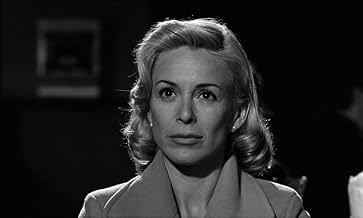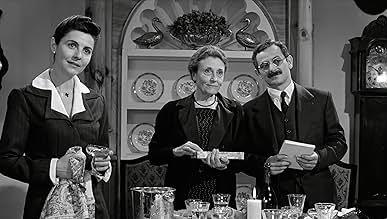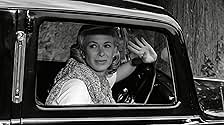Ajouter une intrigue dans votre langueSpain, late 1940s. Julia leaves Madrid after falling into a deep depression when his lover, José Miguel, a prominent painter and opponent of the Fascist regime, is incarcerated.Spain, late 1940s. Julia leaves Madrid after falling into a deep depression when his lover, José Miguel, a prominent painter and opponent of the Fascist regime, is incarcerated.Spain, late 1940s. Julia leaves Madrid after falling into a deep depression when his lover, José Miguel, a prominent painter and opponent of the Fascist regime, is incarcerated.
- Réalisation
- Scénario
- Casting principal
- Récompenses
- 15 victoires et 22 nominations au total
Avis à la une
With 'You're the One' José Luis Garcionce attempts again to create a reminiscent mood piece. However, I felt that the film was lacking. The use of black and white does give it a very classic feel of a movie from the 1950s (which is clearly what the director intended if that wasn't so obvious from the numerous references) but I felt that it would have been much more effective in colour because of the landscape and surroundings that are so stunningly captured by Raúl Pérez Cubero's cinematography. The colour could have been used to add to the atmosphere. The characters are interesting but the spoken lines are clichés. The soundtrack is adequate and the performances are competent. Julia Gutiérrez Caba and Ana Fernández standout. I appreciate the subtlety and the fact that director Garcionce has steered clear of melodrama. The film itself failed to engage me as a whole. I wouldn't say that watching ''You're the One' but in the end there wasn't much that resonated.
This movie has been elected by the Spanish Academy of Cinematography to represent Spain at the Oscar's. In fact, I think it has a lot of possibilities to win. It's one of the best pictures I've seen lately. An elegant and delicate direction, warm and sentimental dialogues, superb performances by all the entire cast... make this film remain in your memory (and in a special place of the heart) once you've seen it. The way it touched me is simply magic.
Whereas the use of black and white in modern films may well be considered appropriate perhaps nowhere better explored to great effect in Spielberg's `Schindler's List' one cannot help thinking that resorting to this vehicle of expression should be for photographic reasons, not in an attempt to kindle preterite ambientation. Therefore the filmed interiors in `You're the One' are reasonably acceptable, but the exteriors should have been in colour. If only for the reason that the Principality of Asturias, on the Cantabrian coastline in the north of Spain, has some of the most beautiful scenery you are ever likely to see. Asturias majestically sweeps from peaks of over 2,000 metres down to the sea, fragmented by the most beautiful river valleys in deep gorges.
Apart from that little quibble, suffice to say that with `You're the One' Garci is bent on continuing his overly sensibilised incursions into yesteryear, taking great pains over the details of each scene, in order to produce a story which is supposed to awaken a rather varied range of feelings in the viewer. It depends on how old the viewer is and where the viewer lives .. If the viewer is too young or not Spanish, he may well rush out and get a DVD of `The Lord of The Rings' or the latest blockbuster from Seagal, Willis, van Damme and the like. However, a viewer of my age the same as Garci who has any recollections whether favourable or not of the social conditions reigning in Spain in those bygone decades, the reaction is likely to be something like: yes, very nice, but
It is this `but' which worries me. Ever since `Volver a Empezar' through `La Herida Luminosa' (qv) up to that little masterpiece `El Abuelo' (qv), Garci has used his commendable skill to great effect, evoking real human stories to wonderful effect. This is plainly manifested also in `You're the One', with some really magnificent interpretations, especially by Lydia Bosch and Iñaki Miramón (tut, tut, smoking in a classroom of children .); of course both Julia Gutiérrez Caba and Fernando Guillén are excellent lending `nobility' to the proceedings; we must not overlook the always natural appearance of Manuel Lozano, here as elsewhere in his filmography most notably in his first film `La Lengua de las Mariposas' (qv). Juan Diego plays an excellent part, later overshadowed by his part in the heroic TV mini `Padre Coraje' (qv).
But .. Could not Garci in his reminiscences come a little closer to the modern day? Could he not put on the screen stories of more recent times, instead of delving back into the murky mists of the past? Possibly not: Garci himself is so deeply immersed in the Hollywood of the 1940s and 1950s which he admires so greatly, seemingly he is not disposed to coming out but very much intent on keeping alive that time-worn spirit of `Casablanca' and `Gone With the Wind' et. al. Cinema which, for me, is so outdated and so awkwardly plastic, that I cannot sympathise with Garci's predeliction: it all seems so much from another planet.
The photography is very good. The music has good moments, but frequently wanders off into almost plagiaristic fragments so mindfully aware of Antón García Abril.
Apart from that little quibble, suffice to say that with `You're the One' Garci is bent on continuing his overly sensibilised incursions into yesteryear, taking great pains over the details of each scene, in order to produce a story which is supposed to awaken a rather varied range of feelings in the viewer. It depends on how old the viewer is and where the viewer lives .. If the viewer is too young or not Spanish, he may well rush out and get a DVD of `The Lord of The Rings' or the latest blockbuster from Seagal, Willis, van Damme and the like. However, a viewer of my age the same as Garci who has any recollections whether favourable or not of the social conditions reigning in Spain in those bygone decades, the reaction is likely to be something like: yes, very nice, but
It is this `but' which worries me. Ever since `Volver a Empezar' through `La Herida Luminosa' (qv) up to that little masterpiece `El Abuelo' (qv), Garci has used his commendable skill to great effect, evoking real human stories to wonderful effect. This is plainly manifested also in `You're the One', with some really magnificent interpretations, especially by Lydia Bosch and Iñaki Miramón (tut, tut, smoking in a classroom of children .); of course both Julia Gutiérrez Caba and Fernando Guillén are excellent lending `nobility' to the proceedings; we must not overlook the always natural appearance of Manuel Lozano, here as elsewhere in his filmography most notably in his first film `La Lengua de las Mariposas' (qv). Juan Diego plays an excellent part, later overshadowed by his part in the heroic TV mini `Padre Coraje' (qv).
But .. Could not Garci in his reminiscences come a little closer to the modern day? Could he not put on the screen stories of more recent times, instead of delving back into the murky mists of the past? Possibly not: Garci himself is so deeply immersed in the Hollywood of the 1940s and 1950s which he admires so greatly, seemingly he is not disposed to coming out but very much intent on keeping alive that time-worn spirit of `Casablanca' and `Gone With the Wind' et. al. Cinema which, for me, is so outdated and so awkwardly plastic, that I cannot sympathise with Garci's predeliction: it all seems so much from another planet.
The photography is very good. The music has good moments, but frequently wanders off into almost plagiaristic fragments so mindfully aware of Antón García Abril.
The writer/director of last years foreign film Oscar nominated THE GRANDFATHER, has done it again. Brilliant characters, marvelously acted, filled with the kind of humanity and insight so rarely seen in the cinema today. Lydia Bosch, and the music deserve special mention. This film will no doubt be nominated for this years Oscars in the foreign film category.
Veteran José Luis Garci has delivered a quiet little masterpiece here; a reminder of those beautifully photographed melodramas of the forties. The choice for black and white for the stunning photography was spot on and made it a joy to watch.
There is nothing extra special about this picture except that everything works so well. The actors are superb, the direction sound and with great feeling for the subject matter. This could so easily have become an excruciatingly sentimental tear jerker but it hasn't. It remains on the correct side of true emotion and the sometimes wry humour mirroring the hurt of the three women in the story - each in her own way coping with loss and memories - is a delight to watch.
Julia Gutiérrez Caba as the cigar smoking, wise cracking mother in law to the servant Julia is especially good. Her performance alone makes this worthwhile watching.
There is nothing extra special about this picture except that everything works so well. The actors are superb, the direction sound and with great feeling for the subject matter. This could so easily have become an excruciatingly sentimental tear jerker but it hasn't. It remains on the correct side of true emotion and the sometimes wry humour mirroring the hurt of the three women in the story - each in her own way coping with loss and memories - is a delight to watch.
Julia Gutiérrez Caba as the cigar smoking, wise cracking mother in law to the servant Julia is especially good. Her performance alone makes this worthwhile watching.
Le saviez-vous
- Citations
Don Matias: My God, why haven't you forsaken me?
- ConnexionsFeatures Gunga Din (1939)
Meilleurs choix
Connectez-vous pour évaluer et suivre la liste de favoris afin de recevoir des recommandations personnalisées
Détails
- Date de sortie
- Pays d’origine
- Site officiel
- Langue
- Aussi connu sous le nom de
- You're the One
- Lieux de tournage
- Sociétés de production
- Voir plus de crédits d'entreprise sur IMDbPro
- Durée1 heure 51 minutes
- Couleur
- Mixage
- Rapport de forme
- 2.35 : 1
Contribuer à cette page
Suggérer une modification ou ajouter du contenu manquant

Lacune principale
By what name was You're the one (una historia de entonces) (2000) officially released in Canada in English?
Répondre



























